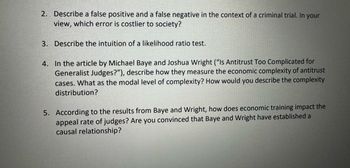2. Describe a false positive and a false negative in the context of a criminal trial. In your view, which error is costlier to society? 3. Describe the intuition of a likelihood ratio test. 4. In the article by Michael Baye and Joshua Wright ("Is Antitrust Too Complicated for Generalist Judges?"), describe how they measure the economic complexity of antitrust cases. What as the modal level of complexity? How would you describe the complexity distribution? 5. According to the results from Baye and Wright, how does economic training impact the appeal rate of judges? Are you convinced that Baye and Wright have established a causal relationship?
2. Describe a false positive and a false negative in the context of a criminal trial. In your view, which error is costlier to society? 3. Describe the intuition of a likelihood ratio test. 4. In the article by Michael Baye and Joshua Wright ("Is Antitrust Too Complicated for Generalist Judges?"), describe how they measure the economic complexity of antitrust cases. What as the modal level of complexity? How would you describe the complexity distribution? 5. According to the results from Baye and Wright, how does economic training impact the appeal rate of judges? Are you convinced that Baye and Wright have established a causal relationship?
Oh no! Our experts couldn't answer your question.
Don't worry! We won't leave you hanging. Plus, we're giving you back one question for the inconvenience.
Submit your question and receive a step-by-step explanation from our experts in as fast as 30 minutes.
You have no more questions left.
Message from our expert:
Our experts are unable to provide you with a solution at this time. Try rewording your question, and make sure to submit one question at a time. A question credit has been added to your account for future use.
Your Question:

Transcribed Image Text:2. Describe a false positive and a false negative in the context of a criminal trial. In your
view, which error is costlier to society?
3. Describe the intuition of a likelihood ratio test.
4. In the article by Michael Baye and Joshua Wright ("Is Antitrust Too Complicated for
Generalist Judges?"), describe how they measure the economic complexity of antitrust
cases. What as the modal level of complexity? How would you describe the complexity
distribution?
5. According to the results from Baye and Wright, how does economic training impact the
appeal rate of judges? Are you convinced that Baye and Wright have established a
causal relationship?
Recommended textbooks for you

Practical Management Science
Operations Management
ISBN:
9781337406659
Author:
WINSTON, Wayne L.
Publisher:
Cengage,

Practical Management Science
Operations Management
ISBN:
9781337406659
Author:
WINSTON, Wayne L.
Publisher:
Cengage,
